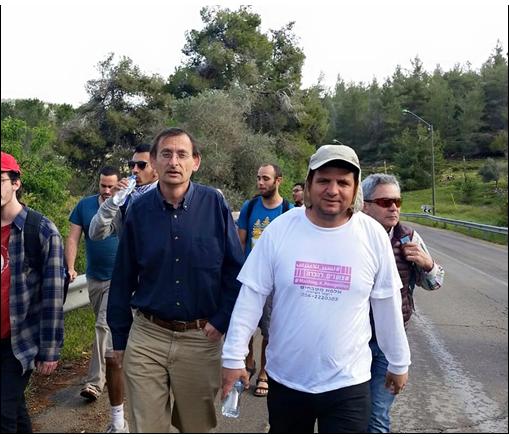Ayman Odeh, head of Hadash (the Democratic Front for Peace and Equality) and leader of the Joint List, is determined to make the Israeli public aware of the rights of Arab-Bedouins living in unrecognized villages in the Negev. For four days, together with activists from the Negev, Odeh marched from the Negev to Jerusalem, covering around 40 kilometers a day, to draw attention to the plight of the unrecognized Bedouin communities in the south of the country, and to help give a voice to this Arab minority. On Sunday, March 29, the march reached its final destination, the Residence of the President in Jerusalem.

Ayman Odeh, right, and MK Dov Khenin approach Jerusalem together with other marchers, Sunday morning, March 29, 2015. (Photo: Al Ittihad)
The marchers, who started out on Thursday, March 26, from the unrecognized village of Wadi an-Na’am, reached the Arab town of Abu Ghosh on the outskirts of Jerusalem on Saturday night. When they arrived at the Residence of the President, on Sunday, the participants of the march held a press conference and presented President Rivlin with a master plan for recognizing their communities. The plan is based on research conducted by the planning rights NGO Bimkom and Sidra, the Negev Bedouin Women’s Association, and emphasizes the benefits of recognizing the Bedouin villages for all residents of the Negev, Arab and Jew alike.
As leader of the newly elected Joint List, Odeh had promised that he would raise the issue of the unrecognized villages months ago. After his party received 13 mandates in the new Knesset, he declared that he would march to Jerusalem before being sworn in as an MK, prior to his making his first speech before Israel’s parliament.
Last Thursday, before setting out from the Negev, Odeh asked the hundreds gathered why 100,000 citizens of Israel are living in unrecognized villages, in deplorable conditions, with no connection to water or electricity, with no easily accessible schools or other public services and institutions.
In December 2013, following massive protest by the democratic forces in Israel, the government canceled the notorious Prawer Plan, which ostensibly offered to acknowledge some of the unrecognized villages, but which mostly sought to perpetuate the discrimination against and the uprooting of the majority of Arab-Bedouin residents of the Negev. Since then, the question has remained unresolved. It is this issue, therefore, which Odeh and the other marchers have brought to the forefront even before the 20th Knesset holds its first session.
Related:
- Joint List Lawmakers to Lead 4-Day March from Negev to Jerusalem for Arab-Bedouin Rights
- Joint List Launches March on Jerusalem for Arab-Bedouin Rights


